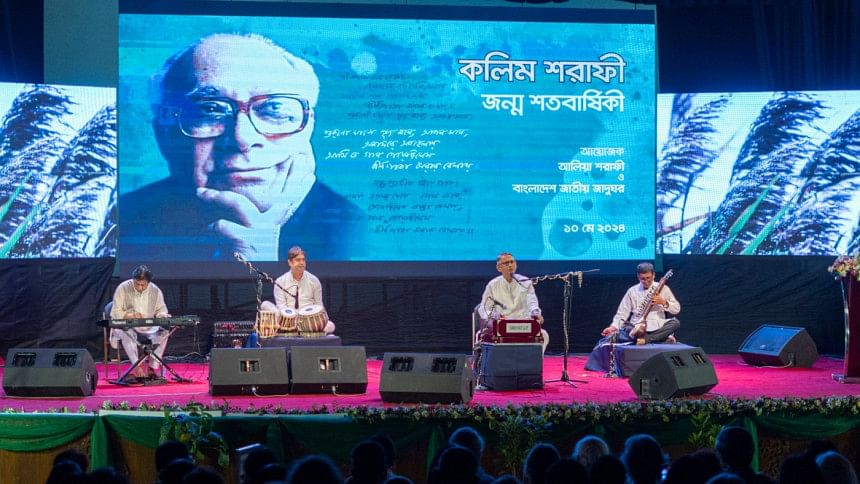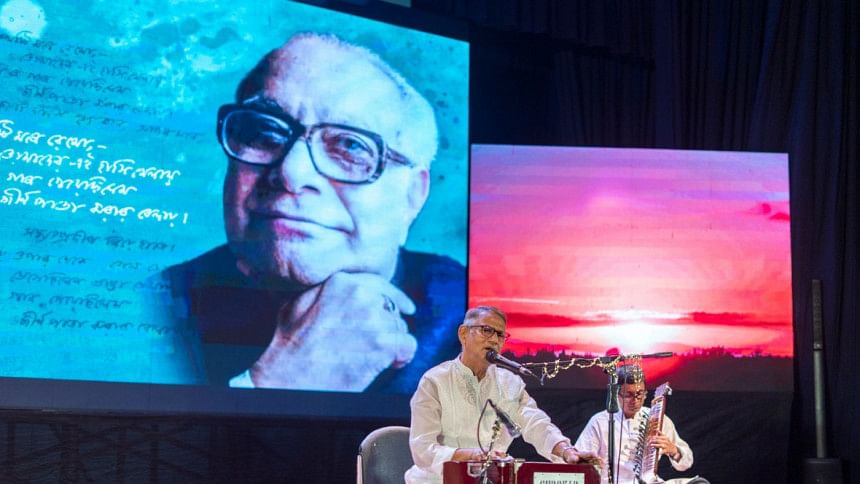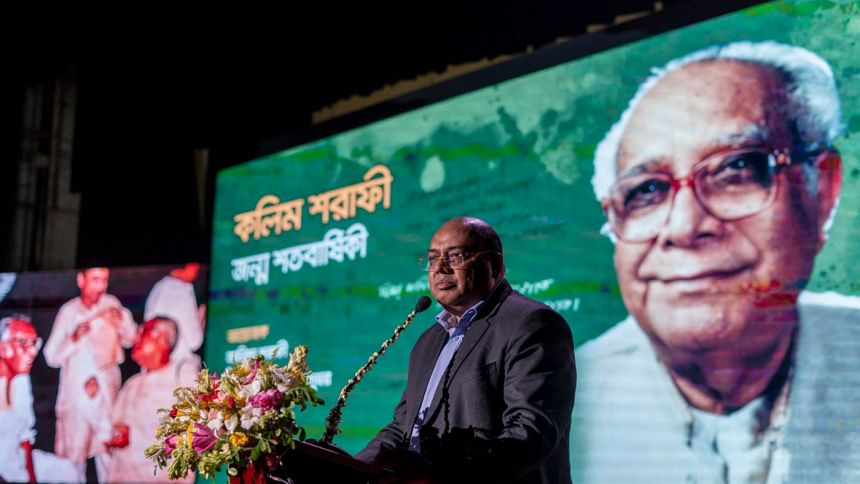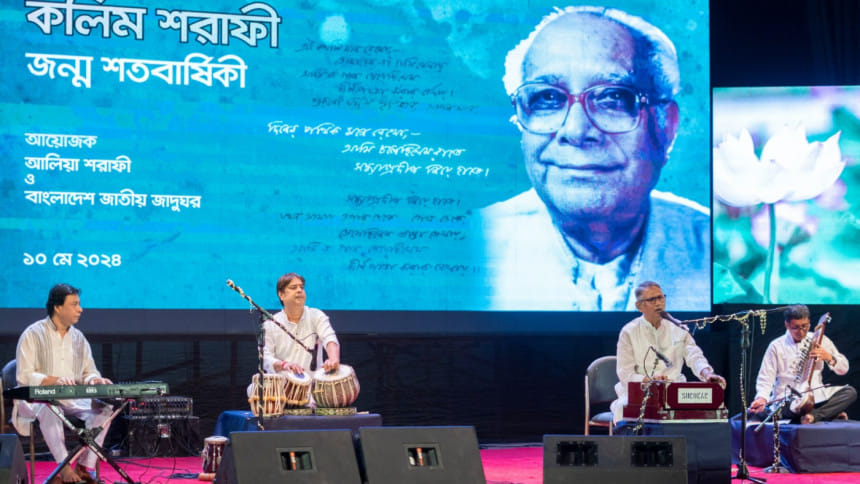Celebrating 100 years of Kalim Sharafi, a cultural icon

As the world commemorates the birth centenary of Kalim Sharafi, his legacy as a cultural icon and activist shines brightly, illuminating the path he forged with unwavering dedication and passion. Born on May 8, 1924 into a family rooted in the village of Khairadihi, West Bengal, Rabindra Sangeet maestro Sharafi's life journey was defined by a profound commitment to using art as a catalyst for social change.

To celebrate the 100th birthday of this luminary, the Bangladesh National Museum, in collaboration with Sharafi's daughter Aliya Sharafi, orchestrated a commemorative programme yesterday (May 10) at the Bangmata Sheikh Fazilatunnesa Mujib Auditorium. The event brought together family members, disciples, and well-wishers of the legendary Rabindra Sangeet singer.
In a hall brimming with anticipation and reverence, audiences listened intently as speakers shared reminiscing reflections on the profound impact of the late musician and cultural activist on Bengal's identity as a nation. Aliya Sharafi, in her heartfelt welcome address, fondly recalled her childhood with the maestro and traced her musical roots back to her late father's nurturing guidance. She expressed gratitude for the opportunity to unite esteemed guests under one roof, paying homage to Kalim Sharafi's enduring legacy.

As Md Kamruzzaman, director-general of the Bangladesh National Museum took to the stage, to offer his remarks next, he hailed Sharafi as one of the brightest stars of the Bengali cultural scene. "Not only Rabindra Sangeet, of which Kalim Sir was a master, he was one of the pioneers to popularise Gana Sangeet and patriotic songs in pre-independence and post-independence Bangladesh," he declared.
"He will be remembered for his contribution to our country and culture, and we will be forever indebted to him. We are proud to celebrate his 100th birthday here at the National Museum," he concluded.
From his early years, Sharafi displayed a fervent interest in both politics and the arts, a passion that would shape his lifelong endeavours. Inspired by the ideologies of Marxism and anti-imperialism, he immersed himself in political activism while nurturing his love for music, dance, and theatre, explained prominent theatre personality and filmmaker Nasir Uddin Yousuff.

"His experiences during the tumultuous years of pre-independence India laid the foundation for his unwavering commitment to cultural activism. Sharafi's involvement in various political movements, including Gandhi's 'Quit India' movement and the struggle against communalism, showcased his deep-seated belief in the power of art to ignite social consciousness. His participation in the Indian People's Theatre Association (IPTA) marked the beginning of his significant musical journey, where he used his voice to sing patriotic and anti-imperialist songs, gaining prominence as a voice of resistance," said Yousuff.
"Despite facing numerous challenges, including political persecution and censorship, Sharafi remained undeterred in his quest to promote cultural unity and social justice. His contributions to Bangla music, both as a singer and a director, left an indelible mark on the cultural landscape of Bengal," he continued.
In independent Bangladesh, Sharafi continued his tireless advocacy for cultural activism, serving as a beacon of inspiration for future generations. His establishment of institutions such as Sangeet Bhaban, and Bahurupi (pioneering group theatre organisation) and his unwavering support for Rabindra Sangeet epitomised his commitment to preserving and promoting the rich cultural heritage of Bengal.
Echoing Nasir Uddin Yousuff's sentiments, the State Minister of Social Welfare of Bangladesh, Dipu Moni, emphasised the pivotal role of political and cultural activism in shaping the nation's history.
"Through Sharafi's life and work it becomes evident that the collective endeavours of both political and cultural activists have been instrumental in shaping the course of our nation's revolutions and resistances. In the face of oppression, these activists have stood as pillars of resilience, forging an unwavering resistance that has left an indelible mark on our national identity," she said.
"Kalim Sharafi, a towering figure in this narrative, embodied the essence of an institution unto himself. His unwavering belief in "activism for the people" and his exemplary role as a revolutionist remain etched in our collective consciousness. Today, we honour his memory with profound respect and gratitude for his invaluable contributions to our nation's journey," she remarked.
Ramendu Majumdar, a prominent theatre personality mentored by Kalim Sharafi, reflected on Sharafi's profound impact on shaping and popularizing radio and television media in Bangladesh, especially during and after the liberation war of 1971. Majumdar praised Sharafi's vision to transform these mediums into platforms for progressive and revolutionary expression, noting how Sharafi inspired and mobilized his fellow citizens. "Today's program signifies a significant milestone," Majumdar remarked, "yet we owe much more to him. Let us repay this debt by preserving his legacy and contributions."
In a heartfelt tribute, State Minister of Cultural Affairs of Bangladesh, Naheed Ezaher Khan, reminisced about her experience learning Rabindra Sangeet from Kalim Sharafi in the 1980s. She recalled his emphasis on singing from the heart and soul, rather than focusing solely on technical finesse. "Kalim Sir was not just a teacher," she said emotionally, "but a father figure to me." Khan pledged to honour Sharafi's memory by preserving his teachings through books and other cultural initiatives, ensuring his enduring impact on future generations.
Throughout his life, Sharafi received numerous accolades and honours, including the prestigious Ekushey Padak and Shadhinata Padak. However, his true legacy lies not in the awards he received but in the lives he touched and the hearts he inspired.

As we celebrate the centenary of Kalim Sharafi, let us remember his indomitable spirit, his unwavering commitment to social justice, and his belief in the transformative power of art. May his legacy continue to inspire future generations to use their voices and talents for the betterment of society, just as he did with unmatched passion and dedication.
In commemorating Kalim Sharafi's life and legacy, we honour not just a cultural icon but a visionary whose life was dedicated to the noble pursuit of a more just and harmonious world.

 For all latest news, follow The Daily Star's Google News channel.
For all latest news, follow The Daily Star's Google News channel. 









Comments